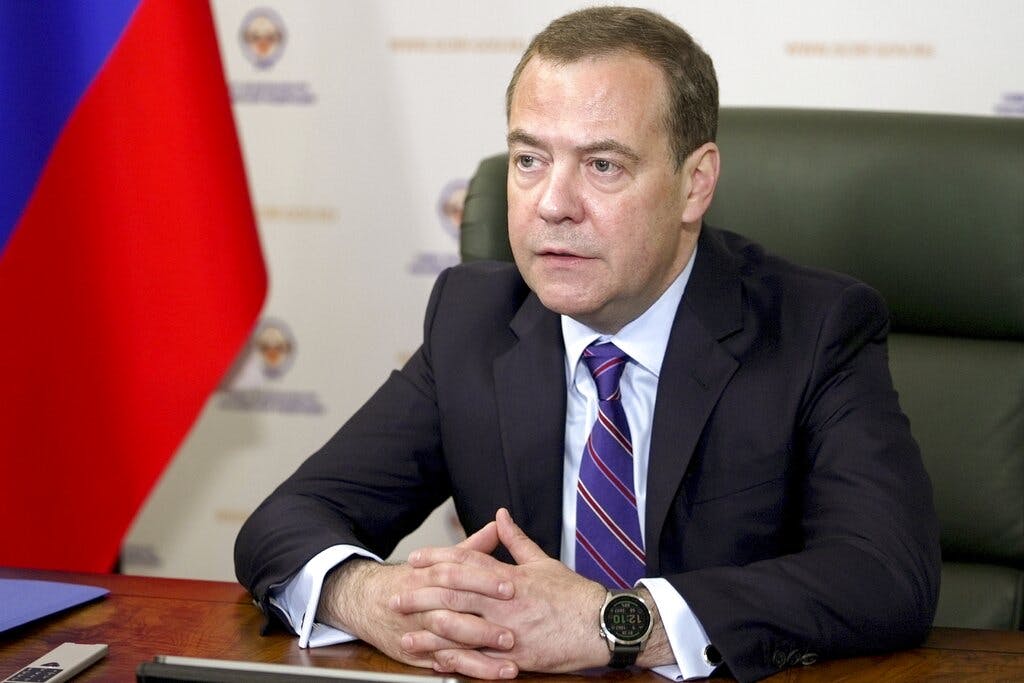In Bizarre Rant, Former Russian Leader Threatens Georgia and Kazakhstan
Dmitry Medvedev’s new tirade was withdrawn almost as quickly as it surfaced on his page on the social media network VK.

The language of diplomacy appears to have deserted Russia’s former president and prime minister, Dmitry Medvedev, who has claimed that the ex-Soviet nations of Georgia and Kazakhstan are artificial constructs where “there will be no order” until the Russians arrive. Mr. Medvedev, who serves as the deputy head of Russia’s security council, has on a prior occasion said Russia would make sure that Ukraine “disappears from the map.”
Mr. Medvedev’s new tirade was withdrawn almost as quickly as it surfaced on his page on the social media network VK Monday night, and Interfax reported Tuesday that his aide, Oleg Osipov, said the account had been hacked. That seems unlikely: As the Guardian reported yesterday, though Mr. Medvedev promised liberalization when he became president in 2008, he has since the Russian invasion of Ukraine become “an enthusiastic participant in the macho posturing and genocidal rhetoric that have become the main currency of political discourse in wartime Moscow.”
The paper said that prior to the latest post, which Mr. Medvedev shared with his 2.3 million VK followers, he wrote, “I’m often asked why my Telegram posts are so harsh. Well, I’ll answer: I hate them.”
To whom that “hate” was directed was not specified, but Mr. Medvedev has previously referred to the EU leadership as “lunatics” or “imbeciles,” depending on one’s Russian-English dictionary, and less ambiguously called President Biden a “strange grandfather with dementia.”
In his VK post he wrote that “there will never be any more sovereignty parades” in Georgia and Kazakhstan and that all the peoples of the former Soviet Union “will again live together.” He elaborated that the south Caucasus state of Georgia “had never existed before its reunification” with the Russian Empire in the 19th century and that central Asia’s Kazakhstan was “an artificial state.”
Mr. Medvedev’s single presidential term, which ended in 2012, allowed Vladimir Putin to circumvent constitutional term limits. As the Moscow Times reported, “he was appointed to the powerful Security Council in 2020” after an eight-year stint as prime minister. He remains an influential figure in the Kremlin, so even when Mr. Putin takes a softer tack on some issues, such as his statement yesterday that there could be no winners in a nuclear war and that no such war should ever be started, it is worth taking note of the tirades.
There will likely be more of them. A relatively level-headed Russian newspaper, Kommersant, reported that since the beginning of the “military operation” in Ukraine, Mr. Medvedev has been regularly writing posts on social networks critical of Ukrainian authorities and the West. In June, according to Kommersant, he stated that he hates the “bastards and geeks” who “want the death of Russia.”
Those remarks prompted the Italian foreign minister, Luigi Di Maio, to say “this is not a signal for dialogue” and “not the opening the way to a ceasefire” in Ukraine. Prior to that flap, a colleague of the imprisoned Russian opposition politician Alexei Navalny, Maria Pevchikh, put her own spin on the rancorous Russian: “When you feel you are a pointless and pathetic person, like Dmitry Medvedev, you try to reinvent yourself from time to time,” she said in May. “He could have shaved his head, or gone to the gym, but instead he decided to reinvent himself as a hawk.”
In Georgia but especially in politically fragile Kazakhstan, a country that shares a 4,750-mile border with Russia and is home to many ethnic Russians in the north, little of the rhetorical saber-rattling from Moscow goes unnoticed. Mr. Putin is said to have once asked Kazakhstan to join the Russian occupation forces in Ukraine, but Kazakhstan refused.
In 2014, the year that Russia annexed Ukraine’s Crimean peninsula, Mr. Putin told the first Kazakh president, Nursultan Nazarbayev, that he had “created a state on territory where no state had ever existed.”

